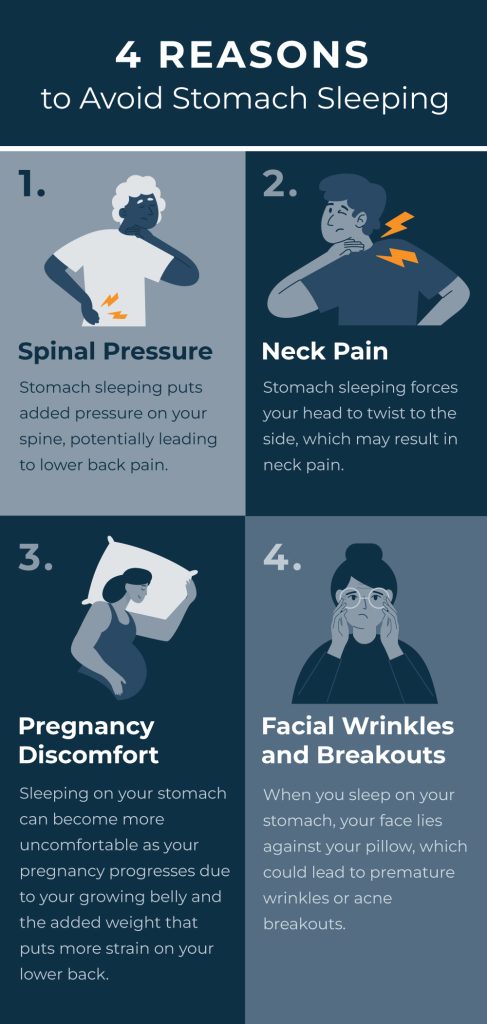With many of us leading busy lives, we’re often happy to get any sleep at all. But what about the position that you’re in while sleeping? Most people don’t think much about it but look for a position that feels comfortable to them. However, you should know that some sleeping positions could actually allow you to sleep better at night.
Although many people love sleeping on their stomach, there are factors you need to consider with this posture, especially if you’re living with any pain in your back or neck.
Is Sleeping on Your Stomach Bad?
Sleeping on your stomach may help improve airflow1 into the lungs, but it may be harmful for other reasons. Let’s have a look at the main reasons why sleeping on your stomach may not be good for you:

1. Puts Added Pressure On Your Spine
Sleeping on your stomach can be bad for your back because it places more strain and pressure on your spine2. The reason for this is that the middle part of your body is exactly where most of your weight is when you lie down. When you lie on your stomach, you’re more likely to sink into the bed and cause your lower back to hyperextend. As a result, you could find yourself waking up with lower back pain.
Related: Best Soft Mattress for Back Pain
2. Neck Pain
Your sleep posture is related to your quality of sleep3. Sleeping on your stomach can lead to increased stress on the neck when not aligned naturally. The right pillow may help alleviate pain, but most people find comfort lying on their back and side.
Learn More: Best Pillows for Neck Pain and Best Mattress for Neck Pain
3. Discomfort During Pregnancy
It gets harder and harder to physically sleep on your stomach in the later pregnancy stages, even if this used to be your favorite sleeping position before pregnancy. Plus, the extra weight around the middle of the body increases the pull on the spine, especially in the prone position.
Instead, experts advise expectant mothers to sleep on their side4, which should also deliver better circulation for both the mother and the infant.
Want to know more? Check out our guide for sleep during pregnancy.
4. Facial Wrinkles and Breakouts
Another drawback to stomach sleeping is that it could cause you to develop more facial wrinkles or breakouts5. This is because your face is rubbing up against your pillow each night. If this is a concern for you, then back sleeping would be the better position.
Additional Stomach Sleeping Considerations
Can Stomach Sleeping Cause Breathing Difficulties?
According to recent research, sleeping on your stomach can help keep your airways open.1
Will Stomach Sleeping Affect My Posture?
As mentioned earlier, stomach sleeping can put stress on your spine, which may eventually lead to pain in the lower back.2 If you have back pain, it’s possible this could impact your posture during the day. So, in this sense, stomach sleeping may indirectly impact your posture.
Is Stomach Sleeping Bad for Digestion?
Stomach sleeping isn’t necessarily bad for digestion, but it could feel uncomfortable with your stomach pressed against your mattress. Instead, the better position to aid digestion is sleeping on your left side specifically, which is why it’s recommended for those with acid reflux6.
Tips for Sleeping On Your Stomach
If you’ve spent your whole life sleeping on your stomach and don’t want to make a change, there are ways to make stomach sleeping work better for you.
- Always use a thin pillow or no pillow at all – The flatter the pillow, the less angled your neck and head will be. View Our Guide: Best Pillow for Stomach Sleepers
- Choose a mattress for stomach sleepers – Typically, that means a slightly firmer than average bed that will keep your midsection lifted to help prevent strain on your lower back.
- Consider a firm mattress – As mentioned above, a good mattress for stomach sleepers will often have a firmer feel to keep the midsection lifted for a healthy spine alignment. For even more great choices for stomach sleepers, take a look at our favorite firm mattresses.
- Put a pillow under your pelvis – This can help keep your back in a more neutral position, taking the pressure off your spine.
- Set aside time to stretch – Two to three minutes of stretching in the morning can help you feel better and improve your flexibility7. Always start the stretching session with a little bit of a warm-up and avoid overdoing it so you don’t pull a muscle.
- Regularly wash your bedding – Keeping your sheets and pillowcases clean could help prevent any unwanted breakouts. The general rule of thumb is to wash your sheets once a week.
- Invest in soft sheets and pillowcases – If you’re concerned about wrinkles and creases on your face from sleeping on your stomach, consider buying soft bedding materials like silk, which can be more gentle against your skin.
Is it Bad to Sleep on Your Stomach FAQs
Is it bad to sleep on your stomach when pregnant?
Stomach sleeping may feel okay early on in your pregnancy, but this can become increasingly uncomfortable the further along you are. Instead, try sleeping on your left side with a pregnancy pillow for added comfort. Not only will this decrease pressure on your spine, but it can improve circulation for the health of you and your baby.3
Why is it bad to sleep on your stomach?
Sleeping on your stomach is bad for several reasons. First, it can put your spine in a poor posture and create added strain on your lower back and neck. Second, it can be uncomfortable for pregnant people as they progress in their pregnancies. Lastly, when your face is pressed up against your pillow, this could lead to more facial wrinkles and acne breakouts.1
Is sleeping on your stomach bad for your heart?
There is no evidence that shows that sleeping on your stomach is bad for your heart.
Patients who recently had a bypass surgery might find this position to be uncomfortable and painful, even if they preferred it prior to surgery. However, experts say8 it’s okay to sleep on your stomach and that you won’t hurt your incisions.
Does stomach sleeping affect snoring or sleep apnea?
Some evidence suggests stomach sleeping may have a positive effect on snoring and mild sleep apnea symptoms because this position (along with side sleeping) can keep the airways more open for better breathing9. More research is needed to make any definitive conclusions.
Does stomach sleeping lead to more wrinkles?
According to research, both stomach and side sleeping could increase your chance of developing wrinkles because the face compresses against your pillow.5

Jill Zwarensteyn
Editor
About Author
Jill Zwarensteyn is the editor for Sleep Advisor and a certified sleep science coach. She is enthusiastic about providing helpful and engaging information on all things sleep and wellness.
Combination Sleeper
Education & Credentials
- Certified Sleep Science Coach
References:
- Lee MD PhD, Ki-Il., Choi MD PhD, Ji Ho. “Positional Therapy for Obstructive Sleep Apnea: Therapeutic Modalities and Clinical Effects”. Sleep Medicine Research. 2023.
- Cary, Doug., Jacques, Angela., Briffa, Kathy. “Examining relationships between sleep posture, waking spinal symptoms and quality of sleep: A cross sectional study”. PLoS One. 2021.
- Lee PhD, Won-Hwee., Ko PhD, Min-Seok. “Effect of sleep posture on neck muscle activity”. Journal of Physical Therapy Science. 2017.
- Cronin, Robin S., et al. “An Individual Participant Data Meta-analysis of Maternal Going-to-Sleep Position, Interactions with Fetal Vulnerability, and the Risk of Late Stillbirth”. EClinical Medicine. 2019.
- Anson MD, Goesel., Kane MD, Michael A.C., Lambros MD, Val. “Sleep Wrinkles: Facial Aging and Facial Distortion During Sleep”. Aesthetic Surgery Journal. 2016.
- Godman, Heidi. “What’s the best sleep position to combat heartburn?”. Harvard Health Publishing. 2022.
- “Flexibility Exercise (Stretching)”. American Heart Association. Last modified January 22, 2024.
- “Recovering from Open-Heart Surgery: 6 Things to Expect.”. Michigan Medicine. 2019.
- Afrashi, Arman., Ucar, Zeynep Zeren. “Effect of prone positioning in mild to moderate obstructive sleep apnea syndrome”. Sleep Breath. 2015.